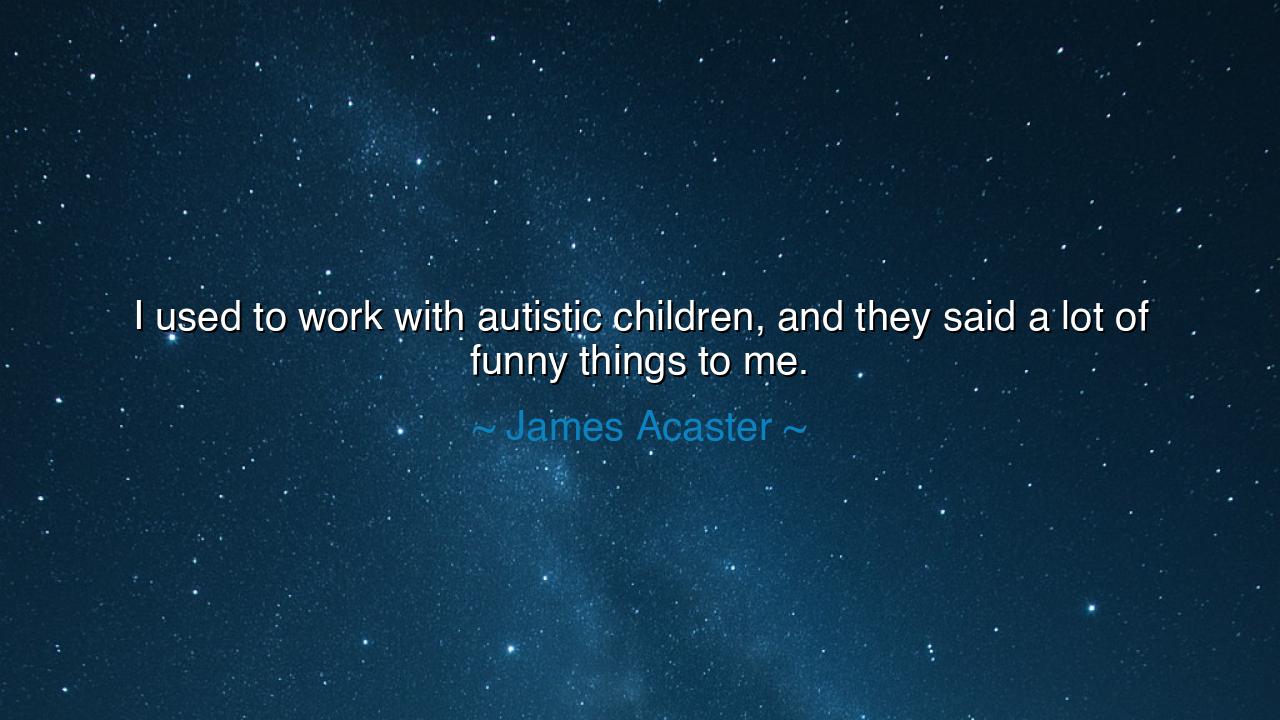
I used to work with autistic children, and they said a lot of






The comedian and philosopher of subtle truths, James Acaster, once said: “I used to work with autistic children, and they said a lot of funny things to me.” At first hearing, this may seem a simple reflection — a gentle anecdote from a life before fame. Yet within this humble statement lies a deep and timeless insight: that humor, innocence, and authenticity are among the purest expressions of the human soul. In these words, Acaster reveals that laughter, when born from sincerity rather than mockery, can become a bridge between worlds — between difference and understanding, between isolation and connection, between the ordinary and the miraculous.
When Acaster speaks of “funny things,” he does not mean to laugh at these children, but rather with them — to recognize the beauty and honesty in their perception of life. For children on the autism spectrum often see the world unfiltered, untouched by the masks of social convention. They speak truth in its rawest form, sometimes strange, sometimes poetic, often unexpected — and in their words, one may glimpse a kind of wisdom that the “normal” mind too often forgets. The funny things they say are not mere jokes; they are the spontaneous music of pure thought, the laughter that springs from innocence, from seeing the world as it truly is, without pretense or artifice.
The ancients, too, honored such simplicity as a form of truth. The philosopher Diogenes of Sinope, known as the “madman of reason,” lived in a barrel and mocked the pride of Athens by acting like a child — raw, unguarded, and free. When Alexander the Great offered him any wish, Diogenes replied only, “Stand out of my sunlight.” His strange humor concealed deep wisdom, for he spoke from the same place as those children Acaster once worked with — a place of unfiltered reality, where what is said may seem odd to the world, but is perfectly aligned with truth. Simplicity, when seen without judgment, often reveals the deepest understanding of life.
Acaster’s quote also reveals something about listening — the quiet art of seeing people as they are, not as society defines them. In his words, there is no condescension, only curiosity and respect. The laughter he recalls is not derisive but reverent — the laughter of discovery, of connection, of seeing beauty where the world teaches us not to look. To laugh in this way is not to diminish, but to celebrate. It is the laughter of those who find light in the unexpected, who recognize that truth, however strange, is still truth. Through humor, Acaster discovered that understanding others does not begin with analysis, but with empathy — with the willingness to be surprised by another’s way of seeing.
Consider the story of Helen Keller, the deaf and blind girl who, with the help of her teacher Anne Sullivan, found her voice. When Keller first learned the concept of language, she laughed and wept all at once — the joy of understanding mingled with the sorrow of realizing all she had missed. Yet her laughter was not tragic; it was transformative. It was the same kind of laughter Acaster speaks of — born from wonder, from the collision of confusion and revelation. Those who heard her laugh said it carried both wisdom and innocence — proof that humor, compassion, and enlightenment often spring from the same well.
The deeper truth of Acaster’s reflection is that humor reveals humanity. The ability to laugh — to find joy even in the peculiar, to see the spark of beauty in what others overlook — is a mark of emotional strength. To work with autistic children, as Acaster once did, is to enter a world of pure perception, where every word is earnest and every moment honest. To find humor there is not to trivialize, but to recognize the sacred in the simple. The funny things those children said were the world speaking through them — unfiltered, unpredictable, and true.
The lesson, then, is this: seek laughter not in superiority, but in sincerity. Listen closely to those whose voices are different, for they may speak truths that the hurried and the proud cannot hear. Learn to find humor in the ordinary, to see the beauty in what others call strange. For in that laughter lies wisdom — the kind that does not divide, but unites. Humor, when born from compassion, becomes not a distraction from life, but an illumination of it.
So, my child, remember James Acaster’s words when the world feels heavy or incomprehensible. Look for the lightness that hides within the serious, the humor within the hardship, the laughter within the learning. When you meet others whose view of the world differs from yours, listen — and laugh with them, not at them. For every soul, no matter how different, carries a piece of the same truth: that laughter is the language of connection, and that sometimes, the “funny things” we hear are not foolish at all, but the echo of the universe reminding us how to be human again.






AAdministratorAdministrator
Welcome, honored guests. Please leave a comment, we will respond soon